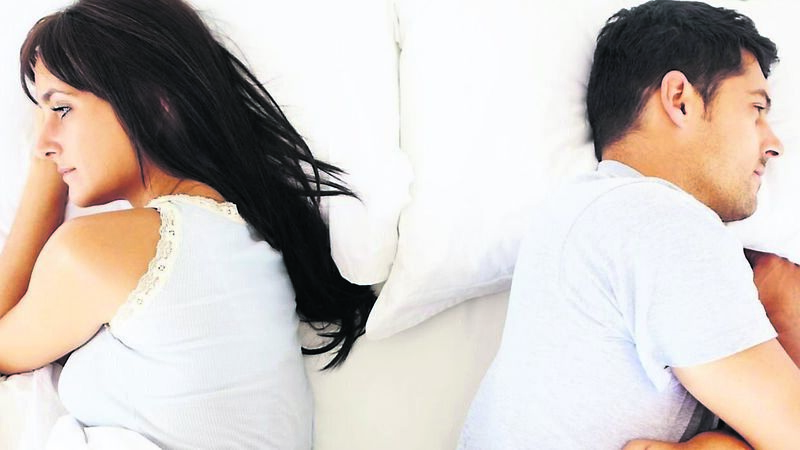Trevor Laffan: Would you consider a ‘sleep divorce’?

They each had single beds on screen, and that was thanks to the Hays Code.
The Hays Code was a set of guidelines, censorship if you like, self-imposed by Hollywood studios, regulating the moral content of films and TV programmes produced from 1934 to 1968.
The Code forbade the use of profanity, obscenity, and racial slurs, and included detailed instructions outlining how certain topics should be shown on screen.
It was also considered inappropriate to show a married couple sharing a bed, or to even suggest that they might.
It was replaced in 1968 by the motion-picture rating system which is still in use today.
It wasn’t unusual either during the late 19th and early 20th centuries for doctors to recommend separate beds to couples for health reasons, like preventing the spread of illnesses or improving sleep quality.
It was believed that a good night’s sleep was easier to achieve without your partner tossing and turning right next to you.
That all changed in the 1960s when the double bed became the norm, but all these years later, could things be changing back again?
Janet Ho is a writer and mental health advocate, and she has written about this subject.
She says that while couples sleeping in separate beds or bedrooms might seem surprising, a 2023 U.S. survey of 2,200 people found that one in five couples sleep in separate rooms, with about two-thirds of those doing so every night.
This practice, sometimes called a ‘sleep divorce’, is more common than many people realise.
While sleeping apart has traditionally been seen as a sign of marital trouble, some experts suggest it’s time to revisit that outdated thinking so we can all get a good night’s sleep.
There was a time when I would have dismissed that notion, but maybe there is merit in it.
Since the day we got married back in 1984, my wife, Gaye, and I have shared the same bed.
It isn’t always straightforward though.
As we get older, our bodies change. My wife suffers from dry-eye, which is a silly name for the condition in my opinion because when she gets a flare-up, her eyes stream with water. One of the triggers that sets her off is air conditioning.
When you consider we spend a lot of our time in Cyprus, where temperatures regularly exceed 30C, you can see how that might cause problems.
I’m not allowed to activate the aircon in the car which is a pain, especially when we’re travelling any kind of distance.
Getting from A to B in an oven on wheels is challenging. You need to keep hydrated in those temperatures too, but drinking water that’s near boiling point isn’t very appetising. It doesn’t do much to cool a body down either.
We have the same issue in the bedroom at night. I am allowed to switch on the air-con for a bit before we go to bed but then it has to go off. Twenty minutes later, the room becomes a sauna once more and we’re back to square one - so we compromise by using an electric fan.
I never expected to be dealing with those issues in Ireland, but during the recent warm spell some of the nights were very humid. We dumped the duvet and just used a sheet, but that created more complications.
I like the sheet lying just loosely on top of me, but Gaye prefers the mummy method. She has to be wrapped in a cocoon and that requires the complete sheet, exposing me to the cooler air in the dead of night.
She went away for a couple of nights with friends recently, so I had the bed and the sheet to myself. It was pure luxury, and I think I got a better night’s sleep too.
Anyway, back to Janet Ho, who says disruptions like snoring, restlessness, bathroom breaks, and different sleep schedules can add up to as much as an hour of lost sleep.
Poor sleep can lead to a host of issues and can negatively impact a person’s productivity and self-esteem, as well as their relationships.
She’s right about the snoring. There are many who make such a racket that sleeping in the same building with them would be difficult, never mind sharing a bed.
While it may seem unconventional, having individual sleep spaces is nothing new. Sleeping in separate bedrooms was popular among royalty.
The late Queen Elizabeth II and the Duke of Edinburgh famously did not share the same bed but always had connecting bedrooms.
There are others who took the whole sleeping together thing a bit too far, like Douglas Castillo.
He pretended to concerned neighbours that his wife was alive and well when they raised concerns about not having seen her in months. He even called out her name when he got home to keep up the ruse she was at alive.
However, the 57-year-old eventually confessed to having killed his wife at their home in Lima, Peru. He also admitted sleeping next to his wife’s decomposing body for a number of weeks.
If ever there was a case to be made for separate bedrooms, that has to be one.







 App?
App?




